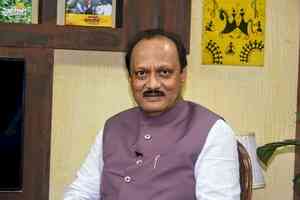IANS Interview: Keeping financial health of state sound is govt’s policy, says Ajit Pawar
In an exclusive interview, Maharashtra Deputy Chief Minister Ajit Pawar, who holds the finance and planning portfolios, denied the Opposition’s charges that the budget proposals were eyewash and misleading.

Sanjay Jog
Mumbai, June 29 (IANS) In an exclusive interview, Maharashtra Deputy Chief Minister Ajit Pawar, who holds the finance and planning portfolios, denied the Opposition’s charges that the budget proposals were eyewash and misleading.
Instead, he told IANS, that the budget proposals were announced after taking into account all legal and financial aspects, especially in the wake of the expected increase in tax revenue. He said that through the budget the state government has reiterated its commitment and determination to scale up growth and achieve an ambitious target of a $1 trillion economy.
IANS: The Opposition has slammed the state government over the budget proposals terming them eyewash and misleading. What is your take?
Ajit Pawar: This is the Opposition's fake narrative. I am not new to all these things. This is my tenth budget and I have taken into account all technical, legal and financial aspects. Due care has been taken on fiscal management, especially restricting the revenue and fiscal deficit within the prescribed limit of 3 per cent of the Gross State Domestic Product. It seems the Opposition's reaction stems from its fear of loss in the forthcoming Assembly elections. The government is committed to effectively implement the budget proposals so that the eligible beneficiaries benefit.
IANS: Women, youth, farmers, Muslims, Dalits, who have voted against the Mahayuti in the General Elections, have been given weightage in the budget. What is your comment?
Ajit Pawar: Maharashtra has achieved development by placing women at the centre, following the legacy of progressiveness of Shiv- Shahu-Phule-Ambedkar. It is our duty, as the government, to open the doors of opportunity to our sisters and encourage them. Keeping in mind this aspect, the government has proposed the comprehensive ‘Mukhya Mantri Mazi Ladki Bahin Yojana,’ to provide Rs 1,500 per month to eligible women between 21 to 60 years of age, for their overall progress, including economic independence, self-reliance, health and nutrition. The ‘Mukhya Mantri Annapurna Yojana’ which will provide three free gas cylinders per household per year, aims to give clean fuel to reduce the health issues of women.
In order to help farmers in distress, the government has proposed among other things, free electricity of up to 7.5 horsepower capacity for agriculture pumps with a provision of Rs 14,761 crore that will be earmarked for subsidy. Besides, as per the ‘Mukhya Mantri Baliraja Vij Savlat Yojana’ the burden of the power bills of farmers for using pumps will be borne by the state government. This will benefit 44.06 lakh farmers. The government plans to give solar pumps to 8.5 lakh farmers. The government is committed to supporting the farmers at various levels, keeping the motto ‘Self-reliant farmers, prosperous farmers.’
A number of proposals for the youth stress on skilling and entrepreneurship development while the financial support is proposed to make the youth more competent and tech-savvy.
IANS: These schemes will put an additional burden of Rs 96,000 crore on the Treasury at a time when a revenue deficit of Rs 20,051 crore and fiscal deficit of Rs 1.10 lakh crore are estimated. Is there enough legroom for these expenses?
Ajit Pawar: The government has enough legroom to bear the additional burden. This is because the state expects tax revenue of Rs 4,19,972.28 crore in 2024-25 against Rs 3,96,051.50 crore in 2023-24. Maharashtra has been on top in the GST collection since it was introduced in 2017. The state is expected to mobilise Rs 2,20,000 crore through GST (Rs 154,000 crore), VAT (Rs 62,500 crore) and professional tax (Rs 3,500 crore). In addition, the government expects higher collection from Excise, Stamp Duty and Registration Fee and other taxes. The government is not compromising fiscal management, instead it is strictly adhering to various parameters.
IANS: Is a $1 trillion economy achievable?
Ajit Pawar: I am of the view that a government or industry or an individual should aim high and take necessary steps to achieve it. The state has been successful in keeping debt within the prescribed fiscal indicators by achieving a balance between deposits and expenditures. Keeping the financial health of the state sound is the government’s policy. Capital investment in the state is being ramped up for a $1 trillion economy. Infrastructure projects will be completed in a timely manner through various public enterprises, special purpose companies and municipal corporations in the state.
(Sanjay Jog can be contacted at [email protected])
--IANS
sj/rad


 IANS
IANS 








